#@cloud technologies
Explore tagged Tumblr posts
Text

#Computer#Ocean#Water#Surreal#Digital art#Keyboard#Mouse#Glass#Reflection#Sky#Clouds#Monitor#Sea#Fantasy#Futuristic#Technology#Nature#Creative#Imaginative#Desktop#Drink
351 notes
·
View notes
Text
Not to sound like a boomer on main, because I love my phone- I do. But I really miss the day when I could hang out in public without having to hear everyone else's phones. I don't care if there are babies crying (because babies cry sometimes) or if other people are having conversations (because that's what people come to cafes and such to do) but hearing tinny little phone sounds blasting out loud out of their speakers drives me insane. I'm only in my 30's, why are you making me complain about how things were "back in my day" like I'm 80? Public phone noise is prematurely aging me. Send help.
#Complaining#Like an old lady#I'm not I swear#But also- Back in my day#*shakes fist at sky*#It's giving “Old man screams at cloud”#I am the old man#Only Im not a man Im a woman and instead of screaming at clouds im slowly having my sanity stolen by people watching videos on their phones#out loud in public spaces#Can we normalize not doing this?#Use headphones or something#Please- I beg of you#technology#cafe#coffee shop#writing#im just trying to write a fun little story i don't care whats happening on your phone#keep it to yourself
742 notes
·
View notes
Text

BSOD v2 Sunset Clouds
#cyberpunk#bsod#netart#vaporwave#technology#computing#retro#nostalgia#windows xp#windowsxp#pop art#ai generated photo#openai#v a p o r w a v e#digital art#a e s t h e t i c#sunset#clouds#photoshop#warakami
414 notes
·
View notes
Text

You know how in the original game, they used the PHS to communicate and switch out party members? Well, I know that canonically Vincent doesn't have a phone, but what if he did?
#cloud strife#vincent valentine#yuffie kisaragi#ff7 rebirth#final fantasy 7 rebirth#ff7#final fantasy 7#vincent: “shinra's latest and greatest technology”#yuffie: “not so latest and not so greatest anymore”#that thing still works too#yuffie spends the rest of the adventure trying to get rid of it#it lasts until they defeat sephiroth when yuffie yeets it into the lake at the capital of the ancients
1K notes
·
View notes
Text





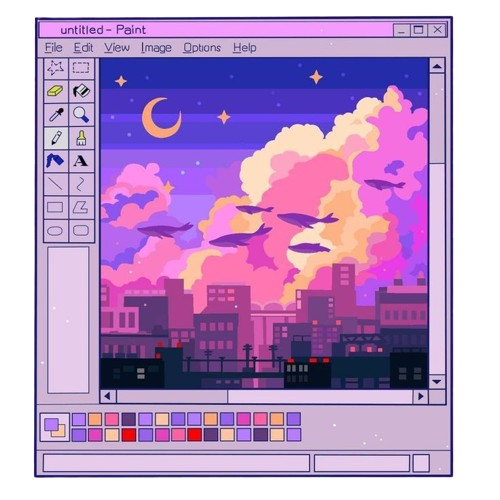



#cute pngs#png#pngs#random pngs#transparent png#transparent pngs#animal pngs#wood pngs#clothes pngs#bottle pngs#pin pngs#skeleton pngs#cup pngs#plate pngs#mushroom pngs#technology pngs#celestial pngs#bug pngs#window pngs#cloud pngs#lava lamp pngs#words pngs#art pngs
72 notes
·
View notes
Text
Cloudburst

Enshittification isn’t inevitable: under different conditions and constraints, the old, good internet could have given way to a new, good internet. Enshittification is the result of specific policy choices: encouraging monopolies; enabling high-speed, digital shell games; and blocking interoperability.
First we allowed companies to buy up their competitors. Google is the shining example here: having made one good product (search), they then fielded an essentially unbroken string of in-house flops, but it didn’t matter, because they were able to buy their way to glory: video, mobile, ad-tech, server management, docs, navigation…They’re not Willy Wonka’s idea factory, they’re Rich Uncle Pennybags, making up for their lack of invention by buying out everyone else:
https://locusmag.com/2022/03/cory-doctorow-vertically-challenged/
But this acquisition-fueled growth isn’t unique to tech. Every administration since Reagan (but not Biden! more on this later) has chipped away at antitrust enforcement, so that every sector has undergone an orgy of mergers, from athletic shoes to sea freight, eyeglasses to pro wrestling:
https://www.whitehouse.gov/cea/written-materials/2021/07/09/the-importance-of-competition-for-the-american-economy/
But tech is different, because digital is flexible in a way that analog can never be. Tech companies can “twiddle” the back-ends of their clouds to change the rules of the business from moment to moment, in a high-speed shell-game that can make it impossible to know what kind of deal you’re getting:
https://pluralistic.net/2023/02/27/knob-jockeys/#bros-be-twiddlin
To make things worse, users are banned from twiddling. The thicket of rules we call IP ensure that twiddling is only done against users, never for them. Reverse-engineering, scraping, bots — these can all be blocked with legal threats and suits and even criminal sanctions, even if they’re being done for legitimate purposes:
https://locusmag.com/2020/09/cory-doctorow-ip/
Enhittification isn’t inevitable but if we let companies buy all their competitors, if we let them twiddle us with every hour that God sends, if we make it illegal to twiddle back in self-defense, we will get twiddled to death. When a company can operate without the discipline of competition, nor of privacy law, nor of labor law, nor of fair trading law, with the US government standing by to punish any rival who alters the logic of their service, then enshittification is the utterly foreseeable outcome.
To understand how our technology gets distorted by these policy choices, consider “The Cloud.” Once, “the cloud” was just a white-board glyph, a way to show that some part of a software’s logic would touch some commodified, fungible, interchangeable appendage of the internet. Today, “The Cloud” is a flashing warning sign, the harbinger of enshittification.
When your image-editing tools live on your computer, your files are yours. But once Adobe moves your software to The Cloud, your critical, labor-intensive, unrecreatable images are purely contingent. At at time, without notice, Adobe can twiddle the back end and literally steal the colors out of your own files:
https://pluralistic.net/2022/10/28/fade-to-black/#trust-the-process
The finance sector loves The Cloud. Add “The Cloud” to a product and profits (money you get for selling something) can turn into rents (money you get for owning something). Profits can be eroded by competition, but rents are evergreen:
https://pluralistic.net/2023/07/24/rent-to-pwn/#kitt-is-a-demon
No wonder The Cloud has seeped into every corner of our lives. Remember your first iPod? Adding music to it was trivial: double click any music file to import it into iTunes, then plug in your iPod and presto, synched! Today, even sophisticated technology users struggle to “side load” files onto their mobile devices. Instead, the mobile duopoly — Apple and Google, who bought their way to mobile glory and have converged on the same rent-seeking business practices, down to the percentages they charge — want you to get your files from The Cloud, via their apps. This isn’t for technological reasons, it’s a business imperative: 30% of every transaction that involves an app gets creamed off by either Apple or Google in pure rents:
https://www.kickstarter.com/projects/doctorow/red-team-blues-another-audiobook-that-amazon-wont-sell/posts/3788112
And yet, The Cloud is undeniably useful. Having your files synch across multiple devices, including your collaborators’ devices, with built-in tools for resolving conflicting changes, is amazing. Indeed, this feat is the holy grail of networked tools, because it’s how programmers write all the software we use, including software in The Cloud.
If you want to know how good a tool can be, just look at the tools that toolsmiths use. With “source control” — the software programmers use to collaboratively write software — we get a very different vision of how The Cloud could operate. Indeed, modern source control doesn’t use The Cloud at all. Programmers’ workflow doesn’t break if they can’t access the internet, and if the company that provides their source control servers goes away, it’s simplicity itself to move onto another server provider.
This isn’t The Cloud, it’s just “the cloud” — that whiteboard glyph from the days of the old, good internet — freely interchangeable, eminently fungible, disposable and replaceable. For a tool like git, Github is just one possible synchronization point among many, all of which have a workflow whereby programmers’ computers automatically make local copies of all relevant data and periodically lob it back up to one or more servers, resolving conflicting edits through a process that is also largely automated.
There’s a name for this model: it’s called “Local First” computing, which is computing that starts from the presumption that the user and their device is the most important element of the system. Networked servers are dumb pipes and dumb storage, a nice-to-have that fails gracefully when it’s not available.
The data structures of source-code are among the most complicated formats we have; if we can do this for code, we can do it for spreadsheets, word-processing files, slide-decks, even edit-decision-lists for video and audio projects. If local-first computing can work for programmers writing code, it can work for the programs those programmers write.
Local-first computing is experiencing a renaissance. Writing for Wired, Gregory Barber traces the history of the movement, starting with the French computer scientist Marc Shapiro, who helped develop the theory of “Conflict-Free Replicated Data” — a way to synchronize data after multiple people edit it — two decades ago:
https://www.wired.com/story/the-cloud-is-a-prison-can-the-local-first-software-movement-set-us-free/
Shapiro and his co-author Nuno Preguiça envisioned CFRD as the building block of a new generation of P2P collaboration tools that weren’t exactly serverless, but which also didn’t rely on servers as the lynchpin of their operation. They published a technical paper that, while exiting, was largely drowned out by the release of GoogleDocs (based on technology built by a company that Google bought, not something Google made in-house).
Shapiro and Preguiça’s work got fresh interest with the 2019 publication of “Local-First Software: You Own Your Data, in spite of the Cloud,” a viral whitepaper-cum-manifesto from a quartet of computer scientists associated with Cambridge University and Ink and Switch, a self-described “industrial research lab”:
https://www.inkandswitch.com/local-first/static/local-first.pdf
The paper describes how its authors — Martin Kleppmann, Adam Wiggins, Peter van Hardenberg and Mark McGranaghan — prototyped and tested a bunch of simple local-first collaboration tools built on CFRD algorithms, with the goal of “network optional…seamless collaboration.” The results are impressive, if nascent. Conflicting edits were simpler to resolve than the authors anticipated, and users found URLs to be a good, intuitive way of sharing documents. The biggest hurdles are relatively minor, like managing large amounts of change-data associated with shared files.
Just as importantly, the paper makes the case for why you’d want to switch to local-first computing. The Cloud is not reliable. Companies like Evernote don’t last forever — they can disappear in an eyeblink, and take your data with them:
https://www.theverge.com/2023/7/9/23789012/evernote-layoff-us-staff-bending-spoons-note-taking-app
Google isn’t likely to disappear any time soon, but Google is a graduate of the Darth Vader MBA program (“I have altered the deal, pray I don’t alter it any further”) and notorious for shuttering its products, even beloved ones like Google Reader:
https://www.theverge.com/23778253/google-reader-death-2013-rss-social
And while the authors don’t mention it, Google is also prone to simply kicking people off all its services, costing them their phone numbers, email addresses, photos, document archives and more:
https://pluralistic.net/2022/08/22/allopathic-risk/#snitches-get-stitches
There is enormous enthusiasm among developers for local-first application design, which is only natural. After all, companies that use The Cloud go to great lengths to make it just “the cloud,” using containerization to simplify hopping from one cloud provider to another in a bid to stave off lock-in from their cloud providers and the enshittification that inevitably follows.
The nimbleness of containerization acts as a disciplining force on cloud providers when they deal with their business customers: disciplined by the threat of losing money, cloud companies are incentivized to treat those customers better. The companies we deal with as end-users know exactly how bad it gets when a tech company can impose high switching costs on you and then turn the screws until things are almost-but-not-quite so bad that you bolt for the doors. They devote fantastic effort to making sure that never happens to them — and that they can always do that to you.
Interoperability — the ability to leave one service for another — is technology’s secret weapon, the thing that ensures that users can turn The Cloud into “the cloud,” a humble whiteboard glyph that you can erase and redraw whenever it suits you. It’s the greatest hedge we have against enshittification, so small wonder that Big Tech has spent decades using interop to clobber their competitors, and lobbying to make it illegal to use interop against them:
https://locusmag.com/2019/01/cory-doctorow-disruption-for-thee-but-not-for-me/
Getting interop back is a hard slog, but it’s also our best shot at creating a new, good internet that lives up the promise of the old, good internet. In my next book, The Internet Con: How to Seize the Means of Computation (Verso Books, Sept 5), I set out a program fro disenshittifying the internet:
https://www.versobooks.com/products/3035-the-internet-con
The book is up for pre-order on Kickstarter now, along with an independent, DRM-free audiobooks (DRM-free media is the content-layer equivalent of containerized services — you can move them into or out of any app you want):
http://seizethemeansofcomputation.org
Meanwhile, Lina Khan, the FTC and the DoJ Antitrust Division are taking steps to halt the economic side of enshittification, publishing new merger guidelines that will ban the kind of anticompetitive merger that let Big Tech buy its way to glory:
https://www.theatlantic.com/ideas/archive/2023/07/biden-administration-corporate-merger-antitrust-guidelines/674779/
The internet doesn’t have to be enshittified, and it’s not too late to disenshittify it. Indeed — the same forces that enshittified the internet — monopoly mergers, a privacy and labor free-for-all, prohibitions on user-side twiddling — have enshittified everything from cars to powered wheelchairs. Not only should we fight enshittification — we must.
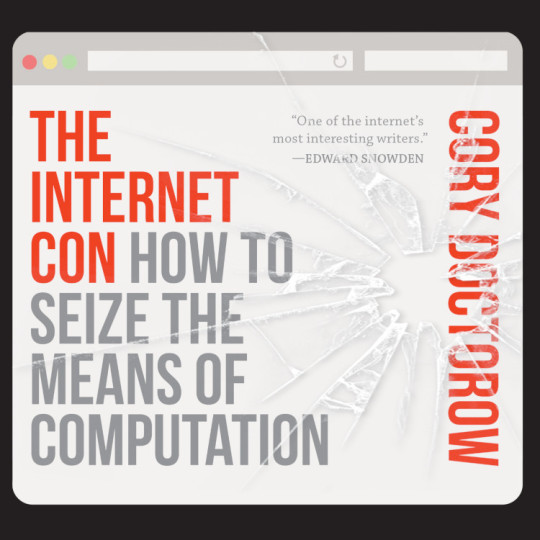
Back my anti-enshittification Kickstarter here!

If you’d like an essay-formatted version of this post to read or share, here’s a link to it on pluralistic.net, my surveillance-free, ad- free, tracker-free blog:
https://pluralistic.net/2023/08/03/there-is-no-cloud/#only-other-peoples-computers

Image: Drahtlos (modified) https://commons.wikimedia.org/wiki/File:Motherboard_Intel_386.jpg
CC BY-SA 4.0 https://creativecommons.org/licenses/by-sa/4.0/deed.en
—
cdsessums (modified) https://commons.wikimedia.org/wiki/File:Monsoon_Season_Flagstaff_AZ_clouds_storm.jpg
CC BY-SA 2.0 https://creativecommons.org/licenses/by-sa/2.0/deed.en
#pluralistic#web3#darth vader mba#conflict-free replicated data#CRDT#computer science#saas#Mark McGranaghan#Adam Wiggins#evernote#git#local-first computing#the cloud#cloud computing#enshittification#technological self-determination#Martin Kleppmann#Peter van Hardenberg
889 notes
·
View notes
Text


400 kV ⚡
#aesthetic#tech#tech aesthetic#grunge#dark#electricity#engineering#technology#cyberpunk#electricity aesthetic#elektrostantsiyapost#power line#power lines#electrical#electrical engineer#electrical engineering#engineers#engineer#engblr#high voltage#dark pale#dark grunge#pale#electricity pylon#pylons#wires#industrial landscape#industrial#sky#clouds
12 notes
·
View notes
Text
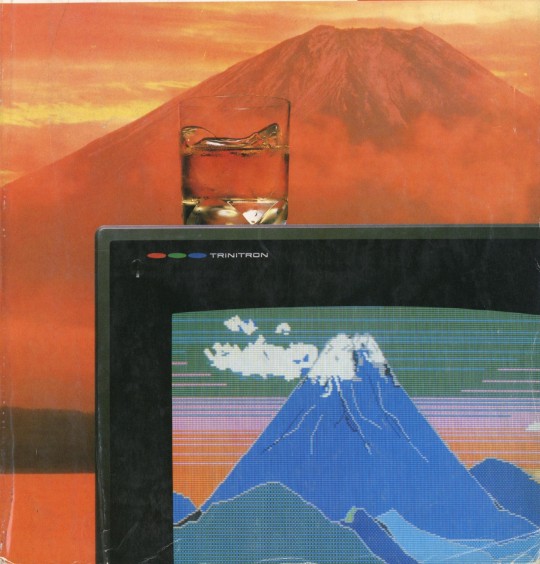
Rendering Ranges
#art#nostalgia#1980s#vaporwave#aesthetic#vintage#magazine#neon colors#1990s#neon#retro computing#computers#computer#mountains#landscape#technology#sunset#sunrise#clouds#photography#japanese#japan
228 notes
·
View notes
Text




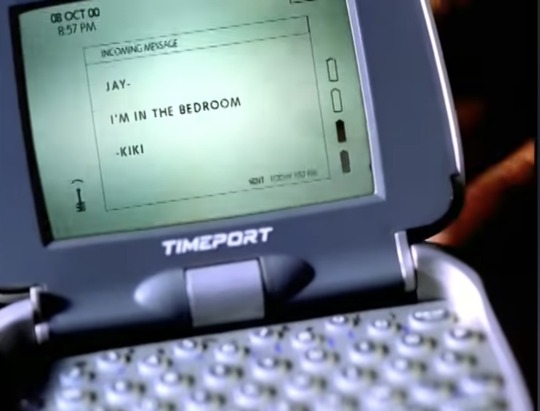


Jay-Z - I Just Wanna Love U (Give it to Me), 2000
#music video#y2k#2000s#rnb#00s#rap#jayz#jay z#the neptunes#pharrell#2000#sky#clouds#speaker#party#cellphone#Motorola#text#sms#hip hop#roc#familia#Kiki#technology#retro tech
69 notes
·
View notes
Text


High-Five! 🖐
#the venture bros#venture bros fanart#vbros#conjectural technologies#augustus st cloud#billy quizboy#venture pete white#speyerart
109 notes
·
View notes
Text
Creed (2015)
#video#michael b jordan#michael b. jordan#sylvester stallone#creed#creed 2015#ryan coogler#movie scenes#adonis creed#rocky balboa#2010s movies#2010s film#cloud#2010s tech#2010s technology
22 notes
·
View notes
Text

404 Clouds
#cyberpunk#vaporwave#clouds#netart#post internet#art#postinternet#dalle2#ai generated art#ai art#pop art#error#error 404#v a p o r w a v e#a e s t h e t i c#aesthetic#digital art#new media art#contemporary art#technology
521 notes
·
View notes
Text
The cursed new phone that I bought on Monday and actually activated on Tuesday keeps telling me there are updates
Where are you getting these updates from you are a newborn baby everything on you has been installed ONE DAY AGO how can there POSSIBLY be that many updates to shit ALREADY fuuuck yooou
17 notes
·
View notes
Note
I love your pride month pngs!!
Can you possibly do transmasc pride or asexual pride? Thank you c:









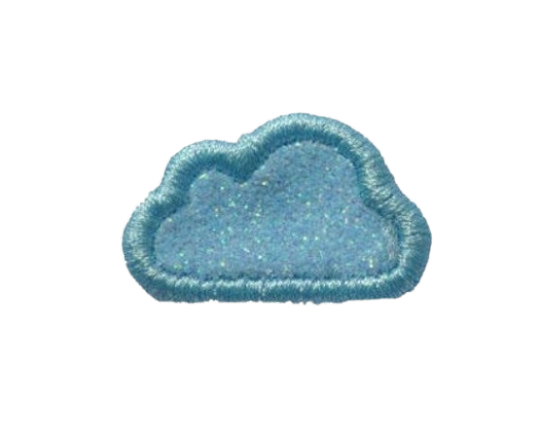
🌸💧
#transmasc#pride pngs#pride month#lgbtqia#transparent pngs#cute pngs#pngs#random pngs#transparent png#png#toy pngs#celestial pngs#instrument pngs#if it involves music i just put it under instrument i know records and vinyls aren't instruments#book pngs#heart pngs#food pngs#art pngs#mirror pngs#hand pngs#technology pngs#light pngs#fish pngs#patch pngs#cloud pngs
43 notes
·
View notes
Note
Hi there!! I love your stimboards so much, they're so nicely put together. I was wondering if you could create one focused on spamton and noelle's friendship (from deltarune) with blue colors, old tech, and wintertime themes? Feel free to go wherever inspiration takes you though :^]
Of course I can, here you go ^^ And thank you!!









🖥️🌀❄️ Platonic Spamton G. Spamton & Noelle Holiday (Deltarune) stimboard with themes of blue, old tech, and winter for @charrfie :3
Thank you for the request, I tried my best ^^ I tried a little bit of a different layout/organisation and I'm not sure if I like it? Whatever. I think this looks alright at least, and I hope you like it :3
I like them ^^ I'm actually a Deltarune fan, but sadly I don't know much about chapter 2 since I haven't gotten around to finishing it...I still like these two though, both separately and in this kind of dynamic :33
Sources:
x | x | x
x | x | x
x | x | x
#stimblr#stimboard#visual stim#spamton g spamton#noelle holiday#deltarune#utdr#winter stim#snow stim#ice stim#snowflake stim#old tech stim#computer stim#technology stim#cloud stim#nature stim#sky stim#blue stim#white stim#i feel like this is kinda bad#ngl
20 notes
·
View notes